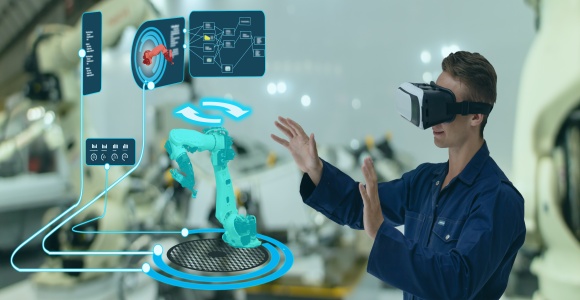Cyber-Human-Lab and World Economic Forum paper outlines opportunities for human-centric transformation of manufacturing

A White Paper authored by members of the IfM’s Cyber-Human Lab team on how the fourth industrial revolution is transforming the relationship between technology and human beings has been published by the World Economic Forum.
In collaboration the World Economic Forum’s Augmented Workforce Initiative, the paper, ‘Augmented Workforce: Empowering People, Transforming Manufacturing’, is expected to inform the agenda at the Forum’s annual Davos meeting which takes place online this week.
Looking at how to leverage augmentation technology to empower people to thrive in manufacturing, the paper:
- illustrates opportunities and benefits of augmentation technology on shop floors,
- presents an implementation guideline for workforce augmentation,
- discusses the way forward: multi-stakeholder collaboration, and,
- provides empirical evidence and use cases for the value-added of augmentation in industry.
Thomas Bohné, Founder and Head of the Cyber-Human Lab, University of Cambridge and Fellow at the World Economic Forum, explains how augmentation provides opportunities to foster a human-centric transformation of manufacturing – to the benefit of both businesses and their employees: ‘Manufacturing leaders now have an opportunity and an obligation to think differently of how we leverage technology to empower employees and improve operational excellence.’
‘To remain competitive in today’s increasingly complex manufacturing landscape, companies need to move beyond an automation narrative and consider the empowering role of augmentation,’ Mirco Moencks, doctoral researcher at IfM and Fellow at the World Economic Forum added.
Elisa Roth, doctoral researcher at IfM and Fellow at the World Economic Forum concluded: 'This involves placing the workforce at the centre of discussions, creating a more accessible and inclusive work environment, increasing employees’ well-being and fostering human connection and collaboration.’
The paper is the latest in a series of activities in which the University of Cambridge and the World Economic Forum work together to provide a platform for organisations in the manufacturing ecosystem to harness the potential of technology-augmented work for a more supportive, engaging, productive, people-centric and inclusive manufacturing and production ecosystem.
About the report
The full White Paper can be downloaded here.
The report was authored by: Mirco Möncks, Elisa Roth, Thomas Bohné of the IfM, Maria Basso, Francisco Betti of the World Economic Forum, with additional contributions from Tim Minshall, IfM.
About the Cyber-Human Lab
The Cyber-Human Lab, based at the IfM, focuses on how technologies can be used to augment human work and improve human performance in industry.
About the Augmented Workforce Initiative
The World Economic Forum’s Augmented Workforce Initiative brings together industry executives, thought leaders, policy makers, and labour unions to understand and harness the potential of human-centric operations on future shop floors, technology-mediated workforce empowerment, augmentation, and digital workforce transformation.









